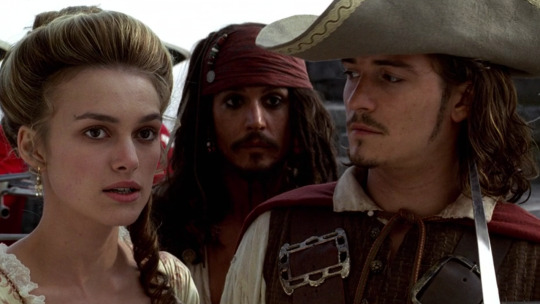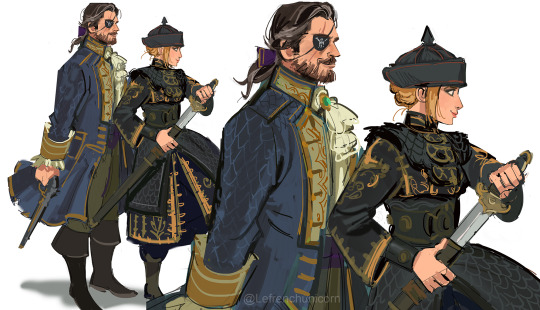side blog of @joanmustbeburned where I descend into the depths of caribbean sea on my little sparrington ship
Don't wanna be here? Send us removal request.
Text
God the fucking poetry in Jack teaching Will his brand of piracy and Barbossa teaching Elizabeth his brand of piracy and how you see it in both of them during the OG trilogy, how Elizabeth makes the more ruthless deals, how she consistently parrots Barbossa’s “they’re just guidelines anyway!” versus Will copying Jack’s chaotic, on-the-fly thinking and getting by partly on wits and part by sheer luck
Many thoughts head full no words to put them in
4K notes
·
View notes
Text
Time for me to once again barf some more nonsense all over your dashes about why I love Pirates of the Caribbean even though it's not cool anymore:
So one of the things the first three PotC movies were especially good at was drip-feeding information about the characters in ways that were both valuable and concise, and building on the characters in ways that were largely consistent and sensible. (I said LARGELY)
Like there's the masterful way Jack's intro to the movies with the sinking boat told us everything about how Jack is simultaneously the Worst and Best at what he does at the same time--how he keeps trying to capitalize on bad situations, even if it actually digs him deeper for a while; or the way the history with Barbossa, Jack, Bootstrap and the Pearl gets unraveled, and how it connects to the protagonists' current conflicts etc.
But one of my favorite things the little things they do to lay the groundwork for (surprise lol) Will's character. People have talked a lot about the way his first CotBP scene with him as a 19-year-old tells you in a matter of seconds:
Will's become a blacksmith apprentice
He's an excellent smith in his own right and takes pride in his work
He's smitten with Elizabeth
The society he's in doesn't grant him respect or recognition for his labor
The society he's in doesn't "approve" of his love for Elizabeth, so he keeps it secret
He currently tolerates these dumb rules of society, even if they're at his expense
All of it is setting up for payoffs later in the story, and all of it done without explicit dialogue, in about 60 seconds. The words "blacksmith," "love," "proud" etc. aren't even mentioned in the scene at all. Instead we're told all of this information with blocking, facial expressions, tones of voice, shifts in mood and allusions. Will delivering the order and Swann's mentioning of his master allows us to infer what Will is. His ability and pride in his work is communicated through the flourish, enthusiasm and knowledge with which he presents the sword to Swann. That combines with Swann treating him as just the errand boy and Will's responding pained smile to nail points 1, 4 & 5 all at the same time...
Which is great and cool! But what I especially love is that that style of storytelling doesn't suddenly stop after each characters' introductory scene--you keep learning about them as the movie progresses. So when you get to his second scene, with that amazing swordfight in the forge, the swordfight isn't just an entertaining stint of action, it tells us more about both Jack and Will at the same time, through both their words and actions.
For example, we learn over the course of this scene that Will didn't just go above and beyond on Norrington's dress sword--he essentially runs the forge alone. Again, this is never explicitly stated in the movie, but instead it's presented in ways we infer: the way Will keeps the smithy in tight order, the apparently-advanced state of Brown's alcoholism and how Will works with it, or the way there's a donkey running the bellows--a detail that both gives us a rocking set piece for the swordfight AND also explains how Will can tend the forge and maintain its temperature by himself.
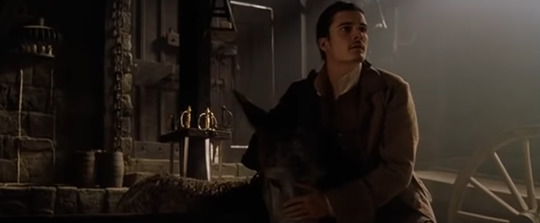
Or for another example: we learn the guy who appeared polite and sweet in that first scene is actually hella repressed and get our first glimpse at how he's kind of batshit crazy. And not only does this fight scene use Will's lusts/desires as a set up for his character arc, but it's beginning a pay off already by this point. How do I mean that? Well, obviously there's the way this scene is building on the prior scene to show that, no, Will is actually NOT cool with where society is keeping him, but he asserts that part of his sword obsession comes from the desire to be able to kill a pirate on sight, which ... WTF, dude? Where did that even come from? Why?
Two reasons, which both were alluded to earlier in the movie for us:

The first is pretty obvious: Will's gung-ho about killing pirates because, as far as he's concerned, they were gung-ho about killing him as a child and trauma therapy didn't really exist in the early 18th century, especially not for the lower classes. The second is a bit more of a reach, but is backed up by commentary from cast and crew: Will's gung-ho about killing pirates, because Norrington is.
PotC is fundamentally the story of Elizabeth Swann and her relationship with her place in society, which means Will's own coming-of-age journey is largely centered in what he can and cannot offer Elizabeth--as a romantic interest, yeah, but also just as a deuteragonist as well. The thing about Will--at least in CotBP--is that his loudest desire is to love Elizabeth, but the other desire that gets overlooked a lot in his character is his craving for recognition. What Will wants, just for himself, is to be Noticed. And because of this, early set up for his character is not only establishing who is, but who he isn't and who he wants to be by using Norrington and Jack as contrasts and benchmarks. This is why they go out of their way to emphasize along the way how young and out-of-place Will constantly is. The giving Mr. Brown credit for everything worthwhile he does, "You are not a military man, you are not a sailor" chastisements, the "whelp" nicknames. Will's a boy, he's poor, he's indentured, he's stupid, he's complacent, he's rash... he's just not Good Enough for her by any measurement.
So in a way, Norrington as a character is a stand-in for the expectations of society for both Elizabeth and Will. Establishing Elizabeth's father's enthusiasm for an engagement with Norrington, establishing him as a rising star in the Navy, not only establishes how Elizabeth is dissatisfied with her life and its trajectory (even if it's not Bad, per se), but also establishes what kind of man Will believes he needs to be to better fit in Elizabeth's world--in the eyes of society, anyway. So a lot of Will's early public image of himself is modeled after who society says a man should be--a man like Norrington. And Norrington is a pirate killer.
So not only is Will's conflict with society underlined and illustrated in his relationship with Norrington, but his main conflict with Elizabeth and what's keeping him away from her is established: he's trying to be like Norrington, the man representative of polite society and thereby representative of who/what Elizabeth does not want--so unwittingly by trying to make himself more suitable, by being something he's not, he's making himself LESS suitable for her--which is implied in their "how many times do I have to ask," "at least once more, Miss Swann" exchange.
And like all of this dense information is packed into the movie about this character in the space of three scenes, all before the major conflict of the movie's first act has even really kicked off. I haven't even touched on yet how this all not only sensibly informs the character and his arc on the back half of the movie, but the payoffs that build on all this in the rest of the trilogy. I'd go on but this is already super long and just...
I freakin' love these first few movies and the lead characters. They're so good.
5K notes
·
View notes
Text

quote from this
[ID: A 3d model of Jack from kingdom hearts 3 stands in front of a neon blue and pink background, showing a circle of light and a cloud of smoke around the bottom of it. Text has been edited in, reading "That's a nice argument. Unfortunately, I had sexual intercourse with your mother and father. (I am bisexual). It has a blue to pink gradient overlay. End ID.]
247 notes
·
View notes
Text
“I’ve always had an affinity for lizards. When (director) Gore (Verbinski) and I were doing Pirates 1,2, 3 and Captain Jack had to run, it was a very specific run that I wanted. I saw this footage of a lizard running across the water and it was the strangest thing I’ve ever seen. So I said, ‘Gore it’s gotta be like a lizard running,’ and he said absolutely.”
—
Johnny Depp

#I watched that lizard running video#it literally is captain jack sparrow#does this mean pirates are lizard people?....#who knows....
114 notes
·
View notes
Video
not sure what this has to do with history, but i feel like it does in some way.
377K notes
·
View notes
Text
one of my favorite little moments in cotbp: when jack is staring dramatically into the distance and gibbs and will try to see what he’s looking at
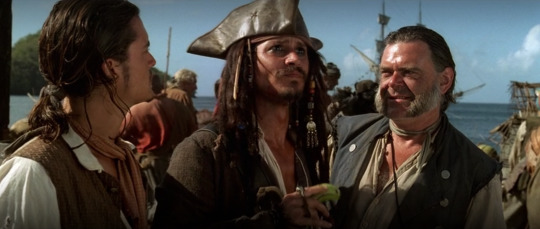
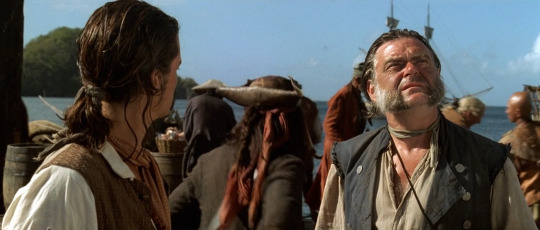
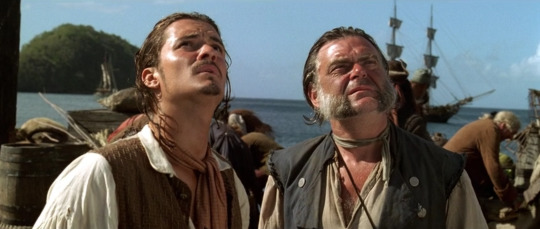
#I also like that jack is holding the banana to his chest FOR SOME UNKNOWN REASON while recruiting his new crew#the curse of the black pearl
441 notes
·
View notes
Text
So here’s a thing…
Everyone always juxtaposes Will and Davy Jones, because there is obvious parallelism to be had: They are two sides of the same coin, showing two different responses to love despite enormous odds—one fails and suffers for it, the other triumphs due to a pure, unbreakable bond.
The more enthralling parallel to me occurs when examining James Norrington and Davy Jones, because they are virtually the same side of the coin.


First, both had their livelihoods wrenched from them, and both felt trapped by the conditions they faced.
Where they differ is in how they respond to their circumstances.
James continues to fight for better days, despite things only getting worse for him with every move he makes. He accepts his fate, but pushes onward: “I can get Sparrow. I can best this hurricane.I can get my career back. I can do a good deed.”
Davy Jones, meanwhile, is content to wallow in his fate, giving up entirely. He stops doing the job charged to him, he suffers for it, and as a result vows to bring on nothing but misery for anyone who crosses his path.


Second, both fell in love with an untamable force of a woman. Both did everything in their power to win said woman. Both failed to either win/keep the love of said woman.
But once again, we see a different response in how each man responds to his heartbreak.
James continually grants Elizabeth the freedom she so desperately craves. His proposal to her is offered only once, and is not addressed again until she offers. Even then he offers her a caveat out (in a deleted scene). He lets her break their engagement in favor of Will. And finally, in his final action, he physically frees her from prison and ensures her safe passage.
Jones imprisons Calypso as punishment for the hurt he feels. He suppresses her power and physically binds her to a single form.
In sum, Jones is a fascinating example of what James could have turned into had he stopped fighting for a better tomorrow, had he retaliated in anger out of his heartbreak, and if he had embraced hate. He didn’t. He embraced love.

The one (non-deleted) scene where these two characters stand off is with James’s dying moments, and it couldn’t be more significant. Jones asks if he fears death, which at surface level sounds just like his typical invitation to join his crew. But it means so much more. He’s asking if James will forsake his living world, the world he’s only shown love and compassion, for Jones’s, a world of hatred and dominance. Even then, with a promise of immortality, James denies him this. And he does it nonverbally. Talk about a power move.
It’s moments like this, and many more I have seen analyzed on this weird little website, that prove to me that Norrington is the best character of the Pirates franchise precisely because of the ways in which he’s not a villain (callout post to CinemaSins who dares suggest otherwise). I want to end this TED talk by reminding you that Norrington was originally written as a character named “Dafoe,” and was going to be a surprise villain who had been working with Barbossa the entire time, revealed at the finale of Curse of the Black Pearl. I don’t know who on the writing team changed this, but I will forever be grateful that they did, because James turned out to be a nuanced tragic hero with a brilliant character arc. He’s not a villain. He never was.
5K notes
·
View notes
Text





“Is there any truth to the other stories?”
“Truth?
... No truth at all.”
316 notes
·
View notes
Text
Okay, but the scene where Jack is going to be hanged in the first Pirates movie and Will has just told Elizabeth he loves her and Elizabeth’s dad and Norrington know some shit’s about to go down but she faints to distract them? Her dad’s look of pure for fuck’s sake when her dad realises she was faking is perfect
2K notes
·
View notes
Photo
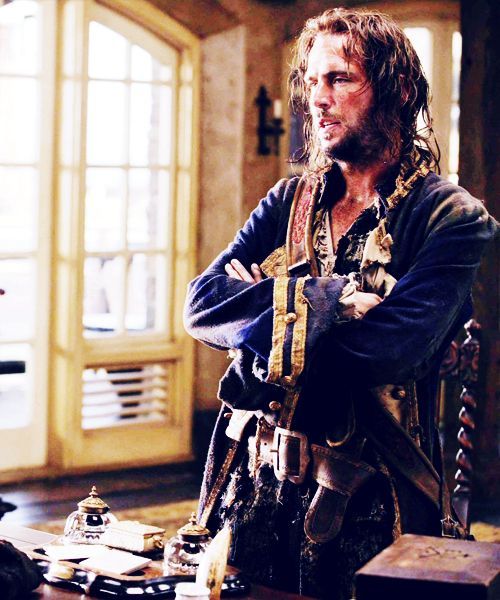
i would like to thank my lord and savior jesus christ for this picture
as someone said on this pin “norrington, look at him, he looks like a gin soaked dish rag, but he out cheated all the other cheaters in the game, and now he’s standing in front of the most powerful man in the world looking like he’s fucking untouchable, because he’s got the best hand and he knows it”
962 notes
·
View notes
Photo




#jack be careful you're playing with fire (and by fire I mean most sarcastic bitchy man to ever live)#dead man's chest
261 notes
·
View notes
Photo


James Norrington’s eyebrow raise in “Curse of the Black Pearl” and “Dead Man’s Chest” requested by seracd
6K notes
·
View notes
Text
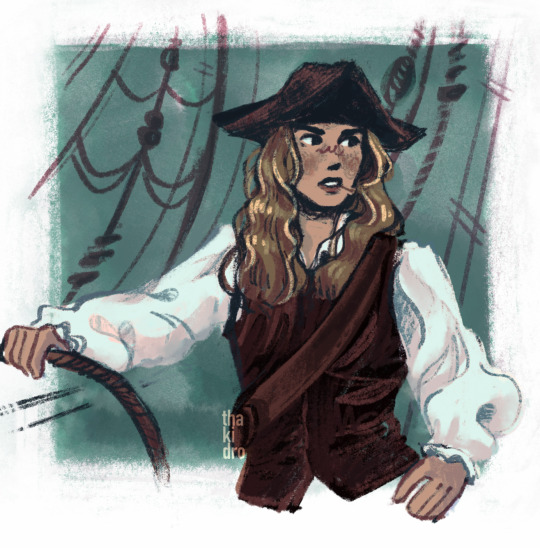
pirate king of my heart 😳😳😳
5K notes
·
View notes








